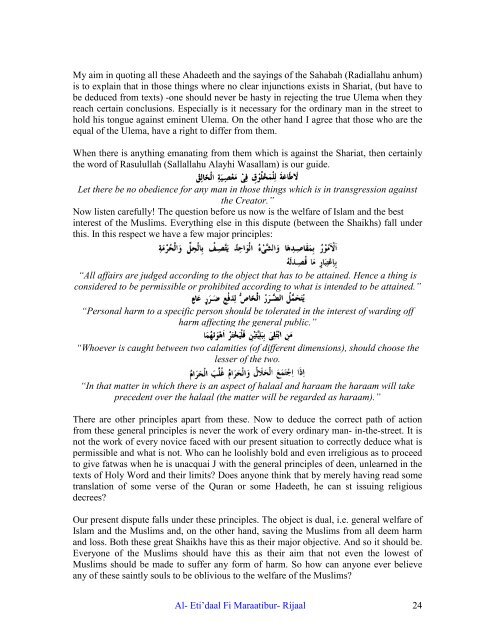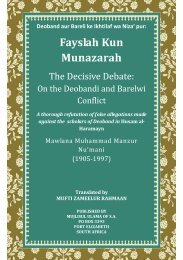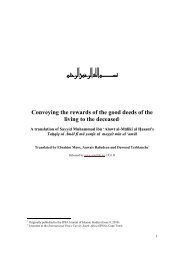al_etidaal_gn
al_etidaal_gn
al_etidaal_gn
Create successful ePaper yourself
Turn your PDF publications into a flip-book with our unique Google optimized e-Paper software.
My aim in quoting <strong>al</strong>l these Ahadeeth and the sayings of the Sahabah (Radi<strong>al</strong>lahu anhum)<br />
is to explain that in those things where no clear injunctions exists in Shariat, (but have to<br />
be deduced from texts) -one should never be hasty in rejecting the true Ulema when they<br />
reach certain conclusions. Especi<strong>al</strong>ly is it necessary for the ordinary man in the street to<br />
hold his tongue against eminent Ulema. On the other hand I agree that those who are the<br />
equ<strong>al</strong> of the Ulema, have a right to differ from them.<br />
When there is anything emanating from them which is against the Shariat, then certainly<br />
the word of Rasulullah (S<strong>al</strong>l<strong>al</strong>lahu Alayhi Was<strong>al</strong>lam) is our guide.<br />
Let there be no obedience for any man in those things which is in transgression against<br />
the Creator.”<br />
Now listen carefully! The question before us now is the welfare of Islam and the best<br />
interest of the Muslims. Everything else in this dispute (between the Shaikhs) f<strong>al</strong>l under<br />
this. In this respect we have a few major principles:<br />
“All affairs are judged according to the object that has to be attained. Hence a thing is<br />
considered to be permissible or prohibited according to what is intended to be attained.”<br />
“Person<strong>al</strong> harm to a specific person should be tolerated in the interest of warding off<br />
harm affecting the gener<strong>al</strong> public.”<br />
“Whoever is caught between two c<strong>al</strong>amities (of different dimensions), should choose the<br />
lesser of the two.<br />
“In that matter in which there is an aspect of h<strong>al</strong>a<strong>al</strong> and haraam the haraam will take<br />
precedent over the h<strong>al</strong>a<strong>al</strong> (the matter will be regarded as haraam).”<br />
There are other principles apart from these. Now to deduce the correct path of action<br />
from these gener<strong>al</strong> principles is never the work of every ordinary man- in-the-street. It is<br />
not the work of every novice faced with our present situation to correctly deduce what is<br />
permissible and what is not. Who can he loolishly bold and even irreligious as to proceed<br />
to give fatwas when he is unacquai J with the gener<strong>al</strong> principles of deen, unlearned in the<br />
texts of Holy Word and their limits? Does anyone think that by merely having read some<br />
translation of some verse of the Quran or some Hadeeth, he can st issuing religious<br />
decrees?<br />
Our present dispute f<strong>al</strong>ls under these principles. The object is du<strong>al</strong>, i.e. gener<strong>al</strong> welfare of<br />
Islam and the Muslims and, on the other hand, saving the Muslims from <strong>al</strong>l deem harm<br />
and loss. Both these great Shaikhs have this as their major objective. And so it should be.<br />
Everyone of the Muslims should have this as their aim that not even the lowest of<br />
Muslims should be made to suffer any form of harm. So how can anyone ever believe<br />
any of these saintly souls to be oblivious to the welfare of the Muslims?<br />
Al- Eti’da<strong>al</strong> Fi Maraatibur- Rija<strong>al</strong> 24




